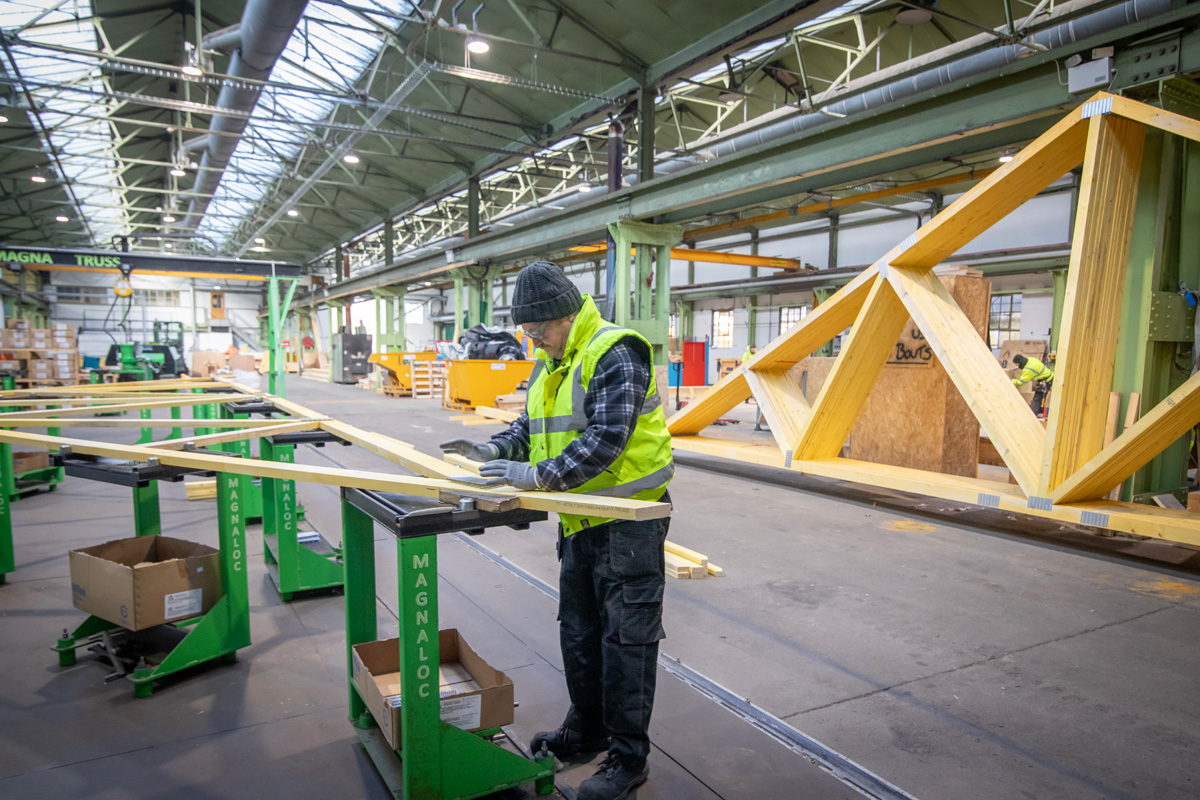
Scotland’s housing sector is at a critical juncture. With soaring construction costs, planning bottlenecks, and increasing regulatory demands, the industry faces mounting challenges in delivering the homes that communities desperately need. As we approach the 2026 Holyrood election, it is clear that housing will be a defining issue—one that requires forward-thinking solutions and a commitment to innovation.
At Deeside Timberframe, we believe timber frame construction is uniquely positioned to address these challenges head-on. By providing a faster, more sustainable, and cost-effective building solution, timber frame can play a crucial role in overcoming Scotland’s housing crisis while meeting ambitious energy efficiency goals.
Tackling Affordability and Speed of Build
One of the most pressing concerns in Scotland’s housing crisis is affordability. Rising material costs and regulatory requirements have made new home construction increasingly expensive, limiting supply and exacerbating demand. Traditional brick-and-block construction methods, while familiar, are slower and often more costly in today’s economic climate.
Timber frame construction, on the other hand, offers significant advantages. As a Modern Method of Construction, timber frame enables homes to be built up to 30-50% faster than traditional methods. Prefabrication in a controlled environment ensures precision, reduces waste, and mitigates on-site delays caused by weather and material shortages. For developers and local authorities seeking to accelerate housing delivery, timber frame provides a proven pathway to reducing build times while maintaining high quality.
Meeting Regulatory and Sustainability Targets
Scotland’s drive toward more energy-efficient homes is a step in the right direction. Proposed energy efficiency standards, including a Scottish equivalent of the Passivhaus standard, reflect a growing commitment to reducing carbon emissions and improving building performance. While such regulations bring additional costs and design considerations, they also present an opportunity to innovate.
Timber frame construction is inherently aligned with these goals. As a naturally insulating material, timber contributes to superior thermal performance, reducing heating demands and lowering energy costs for homeowners. Studies have shown that homes built to Passivhaus standards can cut heating requirements by up to 79% compared to current Scottish building regulations. By combining timber frame with high-performance insulation and airtight design, developers can meet stringent energy efficiency targets while ensuring long-term affordability for residents.
Overcoming Planning and Supply Chain Barriers
Another key obstacle in housing delivery is Scotland’s complex planning system, which can delay projects for years. While planning reform remains a political challenge, developers and housing associations can take proactive steps to streamline construction by adopting MMC solutions like timber frame.
Deeside Timberframe’s offsite manufacturing process allows for better planning predictability and efficiency, ensuring that once planning permissions are granted, construction can progress at pace. Furthermore, by working with local supply chains, we reduce transportation emissions and costs while supporting the Scottish economy.
A Collaborative Approach to the Housing Challenge
Scotland needs more homes, built more efficiently and sustainably. While political debates will continue around the best policy approaches, the construction industry must be ready to deliver. Timber frame is already proving its value in major projects across Scotland, demonstrating that it is not only a viable alternative but a preferred method for addressing the housing shortfall.
Derek Wann, Business Development Director at Deeside Timberframe, highlights the importance of industry collaboration in tackling the housing crisis: “Timber frame construction provides a unique opportunity to accelerate housing delivery while keeping costs under control and meeting sustainability targets. By working closely with developers, planners, and policymakers, we can ensure timber frame plays a pivotal role in the future of Scotland’s built environment. The demand for sustainable, high-quality homes is growing, and timber frame is the ideal solution to meet these needs efficiently and effectively.”
As the 2026 Holyrood election approaches, one thing is clear: the need for innovative, scalable housing solutions has never been greater. Timber frame construction offers a practical, cost-effective, and sustainable way forward—one that ensures Scotland meets its housing needs without compromising on quality or environmental responsibility.
For more information on how timber frame can enhance your next project, contact Deeside Timberframe:
📧 Email us at: info@deesidetimberframe.com
📞 Call us on: 01569 767 123